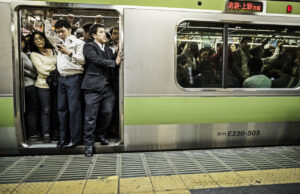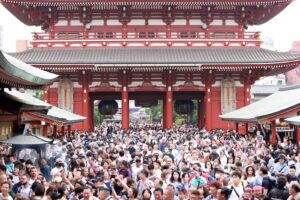Daily reality For many women in Japan, groping on trains is not an occasional risk but a daily concern. Posters warn against it, station staff patrol platforms, and women-only cars exist during rush hours. Yet reports of molestation continue, often underreported and under-discussed. The scale of the problem Police data show thousands of reported cases […] Read more…
Osaka Expo 2025 Is Underway — But Is It Worth the Cost?
The 2025 World Expo in Osaka is officially underway — but it hasn’t exactly captured the public imagination. Held on Yumeshima, a man-made island in Osaka Bay, the Expo was pitched as a celebration of innovation and international cooperation. Instead, it’s been marked by construction delays, spiraling costs and lukewarm public interest. What was once a […] Read more…
The Bizarre Japanese Trend of Paying Someone to Quit Your Job
When I first heard about taishoku daiko — Japan’s so-called “resignation agencies” — I honestly thought it was a joke. Why would anyone pay someone else to quit their own job for them? Then I looked into it. In Japan, quitting a job is more than just a career decision: it can feel like a social betrayal. […] Read more…
Trump’s 25% Auto Tariffs: What It Means for Japan
When Donald Trump says “America First,” Japan often wonders what comes second. The latest flare-up? Trump’s renewed threat to slap a 25% tariff on all foreign-made cars, including those from Japan. In case you missed it, this was the focus of a recent Japan Today Spotlight episode, where we broke down what these potential auto tariffs could mean […] Read more…
Japan’s Tourism Boom: When Success Backfires
After years of strict border controls, Japan is once again a top destination for global travelers. The yen remains weak, flights are full and tourism campaigns—from Hokkaido’s powder snow to Okinawa’s coral reefs—are working exactly as intended. But on the ground, something is off. Overtourism has become one of the defining issues of the post-pandemic […] Read more…
Reflecting on the Tokyo Sarin Gas Attacks: 30 Years Later
Reflecting on the 30th anniversary of the Tokyo sarin gas attack. Read more…
Japan’s Birthrate Crisis — What’s Really Going On?
In the latest episode of Japan Today Spotlight, we dive into something that’s been a growing concern here in Japan for years: the country’s plummeting birth rate. In 2024, Japan recorded just 720,988 births — the lowest number since records began in 1899. It’s the ninth straight year the number has dropped, and it’s creating […] Read more…
Shiori Ito and ‘Black Box Diaries’: What Happens Now?
The Oscars are over, and Shiori It0’s Black Box Diaries didn’t win. Now, the real question is: will this story disappear in Japan? For weeks, we’ve been talking about this exact possibility in the comments on Japan Today and the Japan Today Spotlight video we did. When a Japanese film or filmmaker wins international recognition, […] Read more…










Find me here: